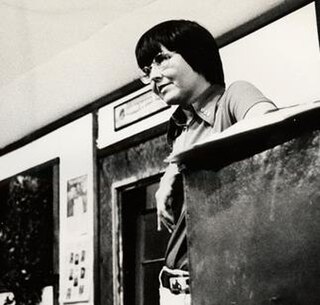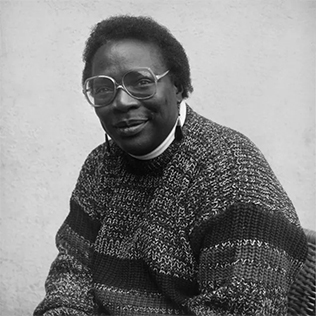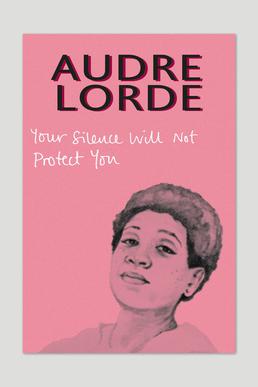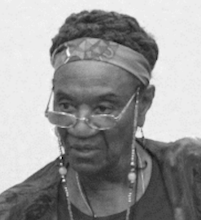
Audre Lorde was an American writer, professor, philosopher, intersectional feminist, poet and civil rights activist. She was a self-described "Black, lesbian, feminist, socialist, mother, warrior, poet" who dedicated her life and talents to confronting different forms of injustice, as she believed there could be "no hierarchy of oppressions" among "those who share the goals of liberation and a workable future for our children."

Mary Daly was an American radical feminist philosopher and theologian. Daly, who described herself as a "radical lesbian feminist", taught at the Jesuit-run Boston College for 33 years. Once a practicing Roman Catholic, she had disavowed Christianity by the early 1970s. Daly retired from Boston College in 1999, after violating university policy by refusing to allow male students in her advanced women's studies classes. She allowed male students in her introductory class and privately tutored those who wanted to take advanced classes.
Kitchen Table: Women of Color Press was an activist feminist press, closely related to the National Black Feminist Organization (NBFO), that was started in 1980 by Barbara Smith, Beverly Smith, and poet Audre Lorde. Beverly Smith and Barbara Smith, and their associate Demita Frazier, had together cofounded the Combahee River Collective (CRC). The Kitchen Table became inactive soon after Audre Lorde's death in 1992. The motivation for starting a press run by and for women of color was that "as feminist and lesbian of color writers, we knew that we had no options for getting published, except at the mercy or whim of others, whether in the context of alternative or commercial publishing, since both are white-dominated."
Firebrand Books is a publishing house established in 1984 by Nancy K. Bereano, a lesbian and feminist activist, in Ithaca, NY. Karen Oosterhouse, its publisher since 2003, describes Firebrand as "the independent publisher of record for feminist and lesbian fiction and nonfiction," championing "authors whose work has been marginalized: women of color, women coming out of poverty, trans women, the genderqueer, and other underrepresented voices." It is among the many feminist and lesbian publishing houses that grew out of the Women's Press Movement; other presses of that period include Naiad Press, Persephone and Kitchen Table: Women of Color Press.
Hattie Gossett is an African-American feminist playwright, poet, and magazine editor. Her work focuses on bolstering the self-esteem of young black women.
Joan E. Biren or JEB is an American feminist photographer and film-maker, who dramatizes the lives of LGBT people in contexts that range from healthcare and hurricane relief to womyn’s music and anti-racism. For portraits, she encourages sitters to act as her “muse”, rather than her “subject”. Biren was a member of The Furies Collective, a short-lived but influential lesbian commune.

The Cancer Journals is a 1980 book of non-fiction by Audre Lorde. It deals with her struggle with breast cancer.

Pat Parker was an African American poet and activist. Both her poetry and her activism drew from her experiences as a Black lesbian feminist. Her poetry spoke about her tough childhood growing up in poverty, dealing with sexual assault, and the murder of a sister. At eighteen, Parker was in an abusive relationship and had a miscarriage after being pushed down a flight of stairs. After two divorces, she came out as a lesbian, "embracing her sexuality" and said she was liberated and "knew no limits when it came to expressing the innermost parts of herself".
Dolores Alexander was a journalist and lesbian feminist best known for her work as Executive Director in the National Organization for Women (NOW) from 1969-1970, as co-owner of the feminist restaurant Mother Courage from 1972-1977, and co-founder of Women Against Pornography (WAP) in 1979. Until her death, in 2008, she continued to believe in the need for the women's rights movement in contemporary times, stating that "It's bigotry, and I don't know if you can eliminate it".
Susan Gayle Abod is an American feminist activist and musician. She is the sister of fellow activist and musician, Jennifer Abod.
The Chicago Women's Liberation Rock Band and the New Haven Women's Liberation Rock Band (1969–1973) sought to challenge the genre of rock music by installing women's voices and feminist-type lyrics into the musical canon. "We loved to dance," stated bassist and vocalist Susan Abod, but referring to a song like The Rolling Stones' "Under My Thumb", "we were dancing to songs that were degrading to us." The Chicago Women's Liberation Rock Band was the self-described "agit-rock" arm of the Chicago Women's Liberation Union, an umbrella organization, "rooted in principles that came to be identified as socialist feminism, and focusing on projects in education, service, and direct-action, by and for women." The Chicago chapter of the band's lineup included: Susan Abod, Sherry Jenkins, Patricia Miller, Linda Mitchell (manager), Fania Mantalvo (drums), Suzanne Prescott (drums), and Naomi Weisstein (keyboards). According to Weisstein, "she tired of hearing pop music glorify the subjugation and degradation of women.... [and] wanted to reach out to young women and at the same time, educate about the importance of feminist culture." She continued "Every time it played, the band summoned up the ecstasy of a utopian vision of a world without hierarchy and domination. Audience and performer, gay and straight, two-year-olds and eighty-two-year-olds, black teenage girls and Latino transvestites: for a moment in history as brief as a shiver, we were, all of us, transformed and astonished."
Ariel Maria Dougherty is an American independent film maker, feminist media advocate and activist. She is best known as the co-founder of non-profit media arts organization Women Make Movies. In recent years she has written extensively about the intersections of women's rights and media justice and the need for increased support for both.

Sister Outsider: Essays and Speeches is a collection of essential essays and speeches written by Audre Lorde, a writer who focuses on the particulars of her identity: Black woman, lesbian, poet, activist, cancer survivor, mother, and feminist. This collection, now considered a classic volume of Lorde's most influential works of non-fiction prose, has had a groundbreaking impact in the development of contemporary feminist theories. In fifteen essays and speeches dating from 1976 to 1984, Lorde explores the complexities of intersectional identity, while explicitly drawing from her personal experiences of oppression to include sexism, heterosexism, racism, homophobia, classism, and ageism. The book examines a broad range of topics, including love, self-love, war, imperialism, police brutality, coalition building, violence against women, Black feminism, and movements towards equality that recognize and embrace differences as a vehicle for change. With meditative conscious reasoning, Lorde explores her misgivings for the widespread marginalization deeply-rooted in the United States' white patriarchal system, all the while, offering messages of hope. The essays in this landmark collection are extensively taught and have become a widespread area of academic analysis. Lorde's philosophical reasoning that recognizes oppressions as complex and interlocking designates her work as a significant contribution to critical social theory.
Queer of color critique is an intersectional framework, grounded in Black feminism, that challenges the single-issue approach to queer theory by analyzing how power dynamics associated race, class, gender expression, sexuality, ability, culture and nationality influence the lived experiences of individuals and groups that hold one or more of these identities. Incorporating the scholarship and writings of Audre Lorde, Gloria Anzaldúa, Kimberlé Crenshaw, Barbara Smith, Cathy Cohen, Brittney Cooper and Charlene A. Carruthers, the queer of color critique asks: what is queer about queer theory if we are analyzing sexuality as if it is removed from other identities? The queer of color critique expands queer politics and challenges queer activists to move out of a "single oppression framework" and incorporate the work and perspectives of differently marginalized identities into their politics, practices and organizations. The Combahee River Collective Statement clearly articulates the intersecting forces of power: "The most general statement of our politics at the present time would be that we are actively committed to struggling against racial, sexual, heterosexual, and class oppression, and see as our particular task the development of integrated analysis and practice based upon the fact that major systems of oppression are interlocking. The synthesis of these oppressions creates the conditions of our lives." Queer of color critique demands that an intersectional lens be applied queer politics and illustrates the limitations and contradictions of queer theory without it. Exercised by activists, organizers, intellectuals, care workers and community members alike, the queer of color critique imagines and builds a world in which all people can thrive as their most authentic selves- without sacrificing any part of their identity.

Women's Institute for Freedom of the Press (WIFP) is an American nonprofit publishing organization that was founded in Washington, D.C. in 1972. The organization works to increase media democracy and strengthen independent media.

Your Silence Will Not Protect You is a 2017 posthumous collection of essays, speeches, and poems by African American author and poet Audre Lorde. It is the first time a British publisher collected Lorde's work into one volume. The collection focuses on key themes such as: shifting language into action, silence as a form of violence, and the importance of history. Lorde describes herself as a "Black, lesbian, mother, warrior, poet", and addresses the difficulties in communication between Black and white women.
Black lesbian literature is a subgenre of lesbian literature and African American literature that focuses on the experiences of black lesbians. The genre features poetry and fiction about black lesbian characters as well as non-fiction essays which address issues faced by black lesbians. Figures within the genre include Ann Allen Shockley, Audre Lorde, Cheryl Clarke, and Barbara Smith.
Angela Bowen was an American dance teacher, English professor, writer, and a lesbian rights activist. She was also the subject of an award-winning 2016 documentary.
Naomi Weisstein was an American cognitive psychologist, neuroscientist, author and professor of psychology. Weisstein's main area of work was based in social psychology and cognitive neuroscience. She considered herself a radical feminist and used comedy and rock music as a way to disseminate her views and ideologies: Weisstein was an active member in founding the Chicago Women's Liberation Union, which promoted feminist activities and improved women's way of life. She received a Bachelor of Arts from Wellesley College in 1961. She then went on to complete her PhD at Harvard University in 1964. After her PhD, she finished her post-doctoral fellowship at the University of Chicago. Furthermore, she was a member of the American Association for the Advancement of Science and the American Psychological Society.

Gloria Ida Joseph was a Crucian-American academic, writer, educator, and activist. She was a self-identified radical Black feminist lesbian writer who synthesized art and activism in her work. Joseph's scholarship centered race, gender, sexuality, and class. She is known for her pioneering work on Black feminism and her activism on issues concerning Black women across the diaspora, including in the South Africa, Germany, and Caribbean.








